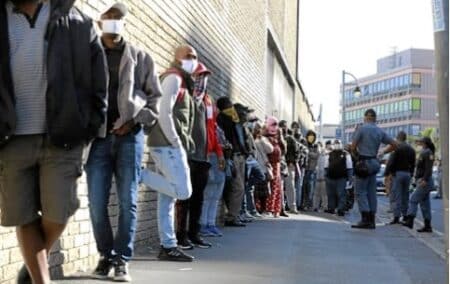The title, ‘#Go Woke, Go Broke,’ tidily packages Helen Zille’s persuasive argument. Only when she pirouettes to close her new book on an up-note does her objectivity bow to posturing: ‘The Worst will not happen, because enough of us continue to work for The Best.’
Just before signing off, she asserts that ‘the ANC’s disintegration will herald a period of profound instability – and no one can predict with any certainty how things will turn out’. This may have been written in haste. The ANC is quite unlikely to fare worse than being the senior partner in a 2024-29 national government.
The party offers no reasons to suspect it might pivot its policies adequately, and we can confidently predict what the status quo will produce. If the 2024 election doesn’t trigger an abrupt policy shift, the already huge portion of our twenty- and thirty-year-olds who have never been meaningfully employed will swell ominously. Poverty and debt traps will further reinforce each other.
The pandemic has confirmed both the ANC’s inability to independently overcome its destructive policy biases and how its leadership instinctively prioritises party interest ahead of national interest. As access to credit markets tightens, ANC-framed policy choices will wreak ever greater havoc. Reviving SAA will look sensible by comparison. Postponing necessary policy pivots until 2029 will entrench rampant unemployment, poverty and intense social turmoil for many decades.
Dynamic political economies exit crises stronger than ever. China has bounced back robustly. The US economy is now expected to be bigger by year-end than pre-Covid forecasts predicted. This reflects massive government deficits being financed at very low rates. High creditworthiness traces to intense competitiveness – which South Africa’s brand of social justice rejects.
Debt being expensive in South Africa reflects economic disabilities. Our young adults are mostly stranded while ten million funeral policies confirm a paucity of intergenerational wealth-building. These are our mammoth injustices and they can’t be remedied through reliance on redistribution.
Economic growth barely keeps up
This country’s economic growth barely keeps up with population growth, while high borrowing costs undermine the government’s financial stability and that of most households. This is a product of policy-makers prioritising redistribution ahead of growth, productivity and efficiency. Ultimately, this traces to our 1990s political transition which led to an expectation that redistribution would make amends for apartheid. The ANC’s leaders constantly spotlight this historical injustice to distract people from their failure to reduce unemployment and poverty.
Redistribution could be achieved during the agricultural era through carving up large plots of land. Communism sought to prevent private ownership of the means of production. Both policies proved unworkable as commerce became increasingly competitive. Since the 1990s, a new era has emerged where tremendous wealth is created through innovation and intense globalisation. Prioritising redistribution today all but assures sputtering growth amid rising unemployment and poverty.
Broad prosperity through redistribution was never an option. Rather, the perception that South Africa is an inherently wealthy country was always dangerous. Moderate extraction possibilities distract from solid growth through greater global integration. Poverty has plummeted in those developing countries that add value to exports destined for wealthy nations.
This sort of inverted colonialism has been extraordinarily beneficial. The two main exceptions in the success story have been sub-Saharan Africa and the lower-skilled workers in wealthier countries. More recently, political divisions have metastasised in the US as traditional media houses, whose revenue models were devastated by the likes of Google and Facebook, have embraced partisan reporting to rebuild their brands.
As in South Africa, the primary US beneficiaries of the industrial era were whites, and those most threatened by current efforts to overcome workplace discrimination are white, particularly men. Major media outlets and the Democratic Party have chosen in recent years to venerate all groups that are seen as having previously been powerless. They ignore or ridicule the plight of lower-skilled whites while simultaneously labelling as unjust the extraordinary gains of the top one percent, who are disproportionately white and male. Entertainers are given a free pass while those who build popular businesses out of thin air are deemed exploitive.
Rejecting reason and free speech
Not to be outdone, privileged university students and social media activists have sought to redefine communication parameters while rejecting reason and free speech. Zille takes them on with aplomb.
She further notes that the US’s institutions, like its economy, can take a heavy jolt whereas South Africa is vulnerable. Our institutions could be stronger, but there is a large threat that our economy is being hollowed out by a majority of our young adults being sidelined. Very few can explore their potential. Our policy-makers’ embrace of seriously outdated social injustice remedies mocks youthful aspirations.
The ANC isn’t going to disintegrate, or even be marginalised, any time soon. Yet the 2024 election must trigger a sea-change, or this country’s prospects will plumb new depths.
South African voters need to deny the ANC a majority in 2024. The ANC’s leadership must then choose the DA as its governing coalition partner. This currently seems unlikely, but the DA can change that. They first needed to reject race-based policies. They must now take to heart Zille’s arguments for countering the political exploitation of social justice concerns.
For the ANC’s elites to choose to form a ruling coalition with the DA in 2024 would require their accepting that their party is too sick to heal itself. The evidence will continue to accumulate, and the DA, voters and thought leaders, must help them appreciate what their hobbled party cannot accomplish.
The debates must pivot from exploiting injustices to expanding jobs. Zille’s book is a big step in the right direction.
[Image: GALLO IMAGES/NARDUS ENGELBRECHT]
The views of the writer are not necessarily the views of the Daily Friend or the IRR
If you like what you have just read, support the Daily Friend

